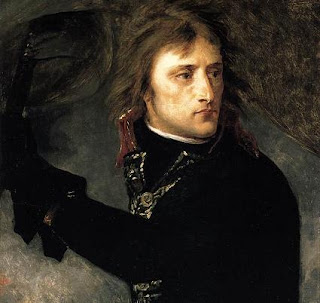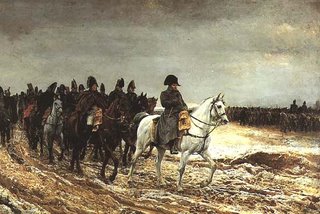Kubrick's "Napoleon" - Part II
The script for Kubrick’s Napoleon originally turned up in 1994 in a salt mine near Hutchinson, Kansas, where film studios stored their archives.
In early 2000, copies traded hands on eBay for hundreds of dollars until the script made its illegal Internet debut. The Kubrick estate had the script removed but not before tens of thousands of fans downloaded it. Of course, now it’s freely available here and many reviews have posted over the years. You cannot help but feel a huge sense of gratitude for having the opportunity, as a screenwriter, to study something as unique as this, the result of a genius’s obsession to make a movie about another genius.
His script spans Napoleon’s entire life from his birth to his death. He starts with a few pages on his childhood, moves on to his quick rise to military power, and then to become head of an empire that ruled over much of Europe.
Then we witness his stunning, heart-wrenching downfall. In Act Three, he mounts his final comeback, regains power, which lasts only a few months, as the entire world moves against him and crushes him.
In order to accomplish an ambitious story like this within 150 pages, a writer is left with no alternative but to make broad strokes of characterizations and highlight the important segments of his life and fill in the gaps with narration, which is exactly what Stanley did. On paper, that sounds like a really boring documentary-style movie, but I think it would’ve worked with Stanley at the helm, because of the
- lush Barry Lyndon-esque visuals
- epic recreations of Napoleon’s battles
- unflinching look at his sex life, highly unusual even in today’s biopics.
Stanley opens with a 4-year-old Napoleon cradling a “well worn teddy bear.” As many of you know, the opening shot of a movie sets up what that movie is about as well as the expectation of what is to come, and in good movies, the first shot and the last are usually connected in some way. Kubrick opens with a teddy bear and he closes with that teddy bear, which is in a box with other toys in his mother’s bedroom.
What’s the significance of the teddy bear?
Why not a lion or a tiger? And why a “well worn” teddy bear? Perhaps it’s a statement about his personality? Or perhaps the bear is a symbolic gesture of his desire later in life to take possession of Russia, a.k.a the “Russian Bear,” which would lead to his downfall.
We’re then given a sequence of about 3 ½ pages where Kubrick establishes Napoleon as the outcast genius, the little boy who thought someone filled his pitcher with glass, which was, in reality, water turned to ice. He is laughed at. He is put down by his dormitory roommates, two bullies - Dufour and Bremond. Throughout this 3 ½ page sequence Dufour and Bremond repeatedly antagonize Napoleon. At the end, he fights them both.
Why two bullies?
I think this may be another symbolic gesture foreshadowing Napoleon’s inevitable downfall, in particular his final battles against Wellington and Blucher, who led the world’s armies against him and defeated him.
But here, “the boys go down in a tangle of bread, jam, and milk.”
Cut ahead to military school, some narration about Napoleon’s growing depth of knowledge, and then we move on to his first sexual encounter, a scene with a “young street-walker” (uncannily similar to a scene in Eyes Wide Shut). They meet on a street in Lyon. They talk about the cold winter weather. It’s almost humorous witnessing Napoleon’s naïveté about the prostitute. “You must be chilled to the bone, standing out of doors like this.” She is, she tells him. They talk. She asks questions. He tells her he’s on leave and that he has a room at the Hotel de Perrin.
“Is it a nice warm room, sir?”
“Well, it must be a good deal warmer than it is here on the street.”
She suggests they go up to his room. It “clicks” in him what she’s after. He says he has very little money. She asks him if he has 3 francs. Cut to Napoleon’s hotel room, lit by one candle. Napoleon sits, fully clothed, watching the girl undress and dive into bed. He wants to talk to her. She suggests that he gets into bed with her. He blows out the candle.
Over the next 13 pages, ending on page 24, Kubrick dives into Napoleon’s very quick ascension to Commander of the Army of Italy.
Napoleon’s rise in power is illustrated with 3 specific sequences:
- Ending a small revolution of peasants,
- Suggesting to the very powerful Paul Barras, “Citizen Deputy,” the winning strategy to recapturing Toulon, an important French naval port that had fallen into the hands of a Royalist insurrection, and
- Napoleon, now a General, saves Barras’ ass again by defeating a huge mob of angry civilians who attack the Convention.
But I’d like to focus on the first sequence, the revolution with the peasants. It lasts 3 pages. This is Napoleon’s first real test. Here, you get a taste of what Kubrick meant with respect to questions about “the responsibilities and abuses of power.” You also see Napoleon’s nature – an aggressive, arrogant, impatient, abuser of power.
The scene takes place in a town square where 300 peasants and town workers have crowded around a cart on top of which stands Monsieur George Varlac, a revolutionary leader, who has been working the crowd into a frenzy.
Napoleon enters on his horse. He leads 25 French troops. He addresses the speaker and says he is looking for Monsieur George Varlac. Varlac admits he is that man.
Napoleon informs him he has a warrant for his arrest for “the murder of Monsieur de Bouchy and his son and the burning of his chateau.”
Varlac tells him to go home.
“Monsieur Varlac, do not pretend to speak for these good people whom you have misled and inflamed with violent speech. Now, I order you down from the cart.”
“I do not recognize the authority of the King or any of his lackeys.”
The crowd laughs.
Varlac continues. “I suggest that you leave with your men while you can.”
(Question - what is the responsible way to handle this situation? I’d say Napoleon should order his 25 troops to grab Varlac and take him away.)
Napoleon pulls out his pistol.
“Monsieur Varlac, I will count slowly to five, and if you have not begun to get down from the cart by then, I will carry out your execution, on the spot.”
He immediately begins counting.
“One... Two... Three...”
People move away from Varlac and the cart.
“Four... This is your last chance, Monsieur Varlac.”
Varlac makes an obscene gesture. The crowd laughs nervously.
“Five...”
“Napoleon rides up to the cart, carefully aims his revolver and shoots Varlac in the head. His entourage leaps to safety. A gasp of astonishment from the stunned crowd, who stand hypnotized.”























5 comments:
Damn. Now why the hell didn't Spielberg make THIS movie??
Hehehe... Thank YOU!
Kubrick never offered this to Spielberg, because he was still saving this story for himself. Besides, Spielberg would've been squeamish about all the sex.
In the next article, you'll see an orgy in a mansion.
-MM
And I should add that there have been rumors over the years about a number of directors who have wanted to do this movie ranging from Michael Mann to James Cameron to Martin Scorcese.
-MM
Can't wait for the next installment. Do you think that Kubrick admired Napoleon in a way that may have tainted the way he told the story?
I have seen many historical dramas and documentaries about Napoleon and depending on who tells the tale, Napoleon can be all over the scale from a nefarious "anti-Christ" to a legendary hero.
I love that scene! Critics complained about it, but I thought they were wrong. This business of revenge invaded every area of his life, including the most intimate aspect. I have no complaints about that.
-MM
Post a Comment